- Home
- David Guterson
East of the Mountains
East of the Mountains Read online
East Of The Mountains
David Guterson
* * *
* * *
Harcourt Brace & Company
NEW YORK SAN DIEGO LONDON
* * *
Copyright © 1999 by David Guterson
All rights reserved. No part of this publication may be reproduced or
transmitted in any form or by any means, electronic or mechanical,
including photocopy, recording, or any information storage and
retrieval system, without permission in writing from the publisher.
Requests for permission to make copies of any part of the work should
be mailed to: Permissions Department, Harcourt Brace & Company,
6277 Sea Harbor Drive, Orlando, Florida 32887-6777.
Library of Congress Cataloging-in-Publication Data
Guterson, David.
East of the mountains/by David Guterson.
p. cm.
ISBN 0-15-100229-0
I. Title.
PS3557.U846E22 1999
813'. 54—dc21 98-40512
Endpaper map copyright © 1998 by Anita Karl and Jim Kemp
Text set in Centaur MT
Designed by Lori McThomas Buley
Printed in the United States of America
038
First edition
E D C B A
* * *
To Robin, always,
and for Henry Shain—he loved the mountains
* * *
There were ten thousand thousand fruit to touch,
Cherish in hand, lift down, and not let fall.
—ROBERT FROST, After Apple Picking
ONE
On the night he had appointed his last among the living, Dr. Ben Givens did not dream, for his sleep was restless and visited by phantoms who guarded the portal to the world of dreams by speaking relentlessly of this world. They spoke of his wife—now dead—and of his daughter, of silent canyons where he had hunted birds, of august peaks he had once ascended, of apples newly plucked from trees, and of vineyards in the foothills of the Apennines. They spoke of rows of campanino apples near Monte Della Torraccia; they spoke of cherry trees on river slopes and of pear blossoms in May sunlight. Now on the roof tiles and against his window a vast Seattle rain fell ceaselessly, as if to remind him that memories are illusions; the din of its beating against the world was in perfect harmony with his insomnia. Dr. Givens shrugged off his past to devote himself to the rains steady cadence, but no dreams, no deliverance, came to him. Instead he only adjusted his legs—his bladder felt distressingly full—and lay tormented by the unassailable fact that he was dying—dying of colon cancer.
Three hours before first light in the east, wide awake and in defeat, he turned on his lamp, put his feet on the floor, and felt the pain bearing down in his side that plagued him through all his waking hours. He felt it where his colon, on the left, made a turn before dropping toward his pelvic cavity; if he pressed his hand into the flesh there, it produced a sensation of irritability seeping through his abdomen. Ben Givens put his fingers against it and began the insistent, delicate caress that had of late become his habit. He plucked his glasses from the side table, fitted their stems behind his ears, and once again probed his side.
To the west the city where he had passed his adult years lay incidental to the force of the rain, and mostly obscured by it. Eastward the rain fell hard against the hills, but higher up on the flanks of mountains it turned to snow dropping silent against glaciers, on slopes of broken talus rock, and on wind-worn buttresses and outcrops. East of the snow-covered crests of the mountains the sky lay almost clear of clouds; save for a few last spectral wisps of vapor floating beneath the chill points of stars, one's view of the heavens was unimpeded. October moonlight illuminated hay fields, vineyards, sagelands, and apple orchards, and the land lay dry and silent. On the sloping, dark verges of the Columbia River, where Ben Givens had entered the world, the apples hung heavily from fragrant trees, and the windfall fruit lay rotting in the night, gathering a pale sheen of frost.
Ben thought of lonely canyons, of how today he would travel eastward to wander in pale, autumnal light with his dogs quartering the ground in front of him and the quail holding when the dogs went on point—and then he rose with the unsteadiness of morning, shuffled to the bathroom still rubbing his side, propped one hand against the wall above his toilet, and waited with bitter, desolate impatience for the muscles of his pelvic region to recollect how to pass night water. He reminded himself that by dusk of that day—if everything went according to his plan—he would no longer be in this world.
Dr. Givens was a heart surgeon, retired, who had specialized in bypass operations. He had been admired by other doctors for his steadiness of hand, his precision, his endurance, his powers of concentration, and his grace. His assistants knew that when the heart was isolated—when everything human was erased from existence except that narrow antiseptic window through which another's heart could be manipulated—few were as adroit as Dr. Givens.
Now he lived in a much-contained fashion: a restrained, particular man. At seventy-three he had a thick chest and broad shoulders, though the muscles in his limbs had gone soft. Since youth he'd climbed mountains and more mountains, and hiked many miles in all seasons. He'd walked in the high country every winter and snowshoed into lonely canyons. These past nineteen months, since his wife died, he'd returned to a haunting, autumn pastime: he'd hunted birds to shoot on the wing for the first time since he was a teenager. This was a pursuit that stole his soul shortly after Rachel's death, after he'd turned from his work as a surgeon and found himself with too much idle time.
His face was weathered and furrowed, his eyes two dark shields. His coarse gray hair looked permanently wind-tousled, and he walked a bit gingerly, with a bowlegged gait, to keep the weight from his instep. He was so tall that, without thinking about it, he ducked his head to pass through doorways. His patients, in past years, had admired his hands: precise, large, and powerful. When he palpated their chests or listened to their hearts, they were infused with his professional confidence. Dr. Givens had believed fervently in medicine and deferred only grudgingly to its limitations. He had not readily accepted defeat and had struggled with the weaknesses of his patients' hearts as if those weaknesses were an affront to him personally. In this way he had removed himself so that when patients died on the operating table he did not have to feel unduly burdened. He did not have to feel haunted. The main questions for him had been tactical; the rest, he'd felt, was all mystery, and so beyond his governance.
None of this meant that Dr. Givens was devoid of tenderness. His heart wavered when the truth of another's lay exposed and irreparable before him. Always at work he had been aware of his divine power of intervention, and of his helplessness, too. He understood the mortality of human beings and the fallibility of their beating hearts, though these things had kept their distance from him, until his own diagnosis. Now he'd been told—it was the dark logic of the world—that he had months to live, no more. Like all physicians, he knew the truth of such a verdict; he knew full well the force of cancer and how inexorably it operated. He grasped that nothing could stop his death, no matter how hopeful he allowed himself to feel, no matter how deluded. Ben saw how his last months would be, the suffering that was inevitable, the meaningless trajectory his life would take into a meaningless grave. Better to end it now, he'd decided; better to avoid pain than engage it. Better to end his life swiftly, cleanly, and to accept that there would be no thwarting the onslaught of this disease.
As had been his practice since the death of his wife, Ben went out to let his dogs in the house immediately after rising. There were roses growing beside their ken
nel—summer damasks his wife had planted—and their stalks shone in the rain. The dogs were awake when he came their way to lift the latch to their fenced-in run, the wizened Tristan staring at him where he stood at four o'clock in the morning with an umbrella tightly over his head, the two-year-old Rex leaping high against the wire mesh as if to scrabble over with his forepaws. When Ben swung the gate wide, the young dog leaped and clutched him at the waist, then ran unbounded out into the rain, leaped at nothing, and returned.
They were brown-and-white Brittanies—Rex ran more toward a bronze hue—with fawn-colored noses, tapering muzzles, and eyes well set back in their heads. They were both broad and strong in the hindquarters, and had little feathering at the legs. Tristan, in another time, had been boundlessly energetic; he'd had the habit of pursuing birds with earnest, exuberant good intentions. Now, in his later years, he was increasingly deliberate, more reluctant to plunge into thorns, and generally stayed closer to hand. His tendency to range had been quieted.
When the dogs were coaxed in out of the rain, Ben fed them in the kitchen. He poured a tumbler half full with prune juice—constipation was one of his symptoms—then swallowed two capsules of Docusate sodium and set his tea water to boil. He was accustomed to reading a newspaper over breakfast, but at this hour the boy who brought it around was no doubt blithely sleeping. Ben laid out melba toast, orange marmalade, two small bags of lemon tea, and a jar of applesauce. He arranged a small plate, a knife and spoon, a bowl, and a cup and saucer. When the water boiled, he filled his thermos, then draped a tea bag over its lip to steep while he attended to breakfast. Despite his contest with sleeplessness, he felt keen of mind on this morning, as well as a calm, compelling urge to establish domestic order. There was a protocol to the day that would be pleasurable to follow, in spite of everything.
The dogs lay easily at his feet while he ate and were still there when he pushed his bowl away, gently rubbed his tender side, and sipped his lemon tea. Both of them rose at the same moment he did and followed him soberly into the bedroom, where he took his gun case from the corner of the closet and slid his shotgun free. At this the dogs froze and looked at him with uncertain curiosity.
Ben sighted down the barrels once, flicked the safety on and off, and broke the gun so as to hold it to the light and inspect the condition of the bores. It had once been his father's shotgun, a Winchester 21 side-by-side, choked for quail and chukars. It dropped an inch and a half at the comb, which was, as it turned out, right for Ben, but the length of pull that had worked for his father had not been entirely comfortable and Ben had added two inches to the stock butt. His father took him when he was eight years old to shoot mourning doves at the edge of the apple orchards. The doves flew up from the Columbia to feed, very swift and flocking wildly in the pale light of morning. Bens father did not broach the subject of hunting's moral perplexity. He only showed Ben how to establish his lead, how to swing through smoothly and easily. Ben's mother, on the other hand, did not approve of bird hunting, and had made her sentiments known to them. Food for the table was necessary, she maintained, but pleasure in killing small birds on the wing was reprehensible in the eyes of God. Ben killed three mourning doves that day and watched them fall at the report of the .410 his father had placed in his hands. He buried their viscera, wings, and heads in a small hole in the ground. Their breast meat was dark and small in the frying pan, dusted with salted flour. He ate the meat with vague regret while his mother watched in silence from the sink, until after awhile she came near to touch his cheek. Then she went to the sink again and scrubbed the pan for him.
Now, in the bedroom, the Winchester in hand, Ben snapped the action closed. He shouldered the gun and swung it along the picture molding, and with his forefinger lightly against the front trigger he squeezed off a silent shot at the seam where the wall met another wall. Rex pranced, high-stepping.
Then Ben set the gun butt against his bed and wrapped his lips around both barrels, as though to fellate them. In this posture he ascertained that in fact the front trigger was just in reach; he had only to extend the full length of one arm, which pushed the sight bead against his palate. If he seized the shotgun in this way, wholly willing, embracing it, allowing the metal to prod his mouth, he could blow the top of his skull off without logistical difficulties. The knowledge that this was indeed possible, that such an act was not out of reach, suffused Dr. Givens with a glandular fear that washed through him like a wave.
Ben put the gun down and packed for his journey with the same judicious deliberation that had been his foremost professional trait: he weighed everything at immoderate length, but made few errors in judgment. He packed his duffel with his upland vest, a box of twenty-five number 8 shells, his shooting gloves, his shotgun sling, a canvas cap with a canted brim, and a whistle hung from a lanyard. He loaded his rucksack with a headlamp and battery pack, maps of Chelan and Douglas Counties, an altimeter, a compass, an aluminum cup, three paraffin fire starters, a roll of waterproof adhesive tape, a medical kit, a needle and thread, an entrenching tool, a folding camp saw, a rain poncho, a length of Manila cord, a pair of field glasses, a vial of lip balm, a tube of sunscreen, prescription sunglasses in their case, a cigarette lighter, insect repellent, a snap box of water-purifying tablets, and a sandwich bag full of toilet paper.
In the kitchen he filled his two water bottles, closed the thermos of tea securely, and turned all three on their heads briefly to check for leaks around the cap seals. He wiped them dry, wiped the table, and washed the breakfast dishes. He had hoped to move his bowels before leaving—the first hour in the car would stop them up firmly, sealing them closed for the length of the day—but he knew there would be no success to the enterprise should he endeavor to sit and wait on the toilet. That would swell his incipient hemorrhoids and encourage the frustration incited in his stomach when he could not void his bowels. Ben was sorry that at the heart of things this day he would carry the sensation of a poisoning fullness and a heavy reminder that he himself was now a blight on the world.
He had taken much of the previous night to page through photograph albums, to read his files of correspondence, and to hold in his hand the earrings and lockets his wife, Rachel, had worn. He had found, in a box, a jar of her sewing buttons, a bulbous-head lavender wand laced with ribbon, a pair of her shoes, a pack of foxglove seeds, and a sketch pad less than a quarter filled with her pencil drawings of trees. He had unzipped the garment bag in the storage room closet and, yielding to sentimentality, burrowed his face into the dresses there in order to retrieve the faint smell of her. He had done like things all evening long and so had found in the endpages of books his mothers neatly fountain-penned signature, and in a hinged cedar box his father's pocket watch, its face glass missing for fifty years. After midnight he came across photos long forgotten, at the bottom of a box, most of Renee, his daughter.
There were photos of him, too. He hadn't been handsome, but he'd been strong and tall, blue-eyed like his mother, lean-jawed like his father. There were photos taken in apple orchards, on the summits of peaks, in uniform, on leave in the mountains of northern Italy.
Now it was morning of the next day. And Ben could not bring himself to extinguish the kitchen light and turn away quite yet. He listened to the hum of the refrigerator and remembered how Rachel had habitually commented on the taste of things they ate together—Jerusalem artichokes dug from the ground, or apples at their sugared prime. He remembered her, too, slicing carrots with a paring knife, the ball of her thumb a stop. Ben shook off his memories, turned out the light, and called the dogs from the living room. It was time to go away from there. It was time to begin his journey.
Dr. Givens kept in his garage a 1969 International Scout, which he used as an adjunct to his sporting life. He had purchased it new twenty-eight years before, and although since then he'd bought and sold other cars, he had not been able to part with the Scout for reasons he could not readily give voice to. He was not a man who fell in love with cars or spoke
of them in endearing terms; nevertheless, he felt for this one a certain enduring fondness. The Scout was modestly well-preserved, but idiosyncratic in keeping with its age, with the tics and uncertainties of passing time. It included a four-wheel transfer case and locking hubs one turned by hand after coming to a halt on the road verge. Its heater fan made a hollow din, and through the moldings where the doors met the windshield—the car's top could be removed in good weather—the wind whistled tonelessly. More disconcerting was that the driver's side window regulator had developed with time a modicum of play: the pane chattered at high speeds and irritated Ben deeply. Twice in three years he had taken the door apart and peeled back the plastic vapor shield in an effort to address the problem. To no avail, however. The play in the regulator was fundamentally ambiguous, or perhaps organic to the entire apparatus, which was deteriorating in all its particulars.
He slid his shotgun across the backseat and set his rucksack and duffel next to it. Then he slung down the rear door and entreated his dogs to load up, urging them to leap against their will. As it turned out, he had to lift Tristan in, because there was no room for a running start.
He opened his garage door to the beating rain, but then it occurred to him he had not made certain that the house was left in proper order—the home of a man who intended to return at the end of an ordinary bird-hunting trip—and he went inside once more. He moved methodically from room to room, until he felt secure in his impression that nothing could prompt a postmortem inquiry, going so far as to leave on the kitchen table the 12-volt bird plucker he'd sent away for last Christmas but never used. He also pulled from a wall cabinet a small file-card recipe box and turned the recipe for quail on toast loosely on the diagonal. He left the box standing on the counter beside the sink with its hinged lid open.

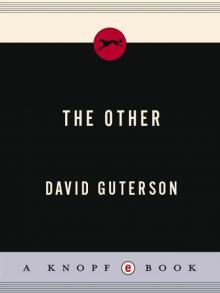 The Other
The Other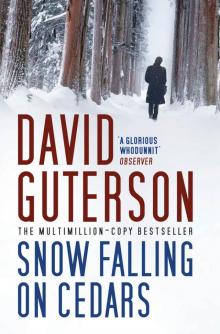 Snow Falling on Cedars
Snow Falling on Cedars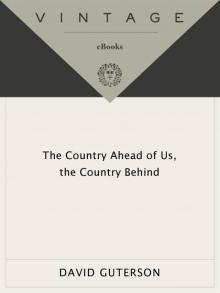 The Country Ahead of Us, the Country Behind
The Country Ahead of Us, the Country Behind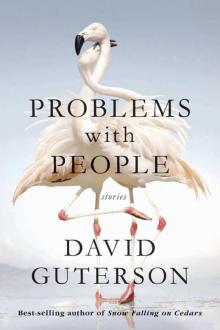 Problems With People: Stories
Problems With People: Stories East of the Mountains
East of the Mountains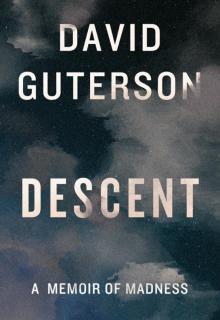 Descent: A Memoir of Madness
Descent: A Memoir of Madness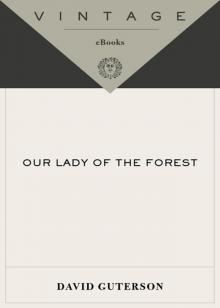 Our Lady of the Forest
Our Lady of the Forest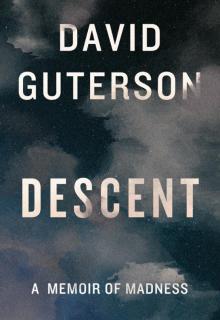 Descent
Descent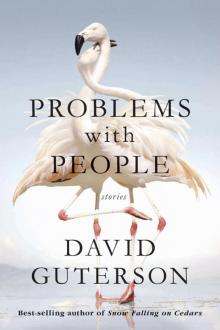 Problems with People
Problems with People